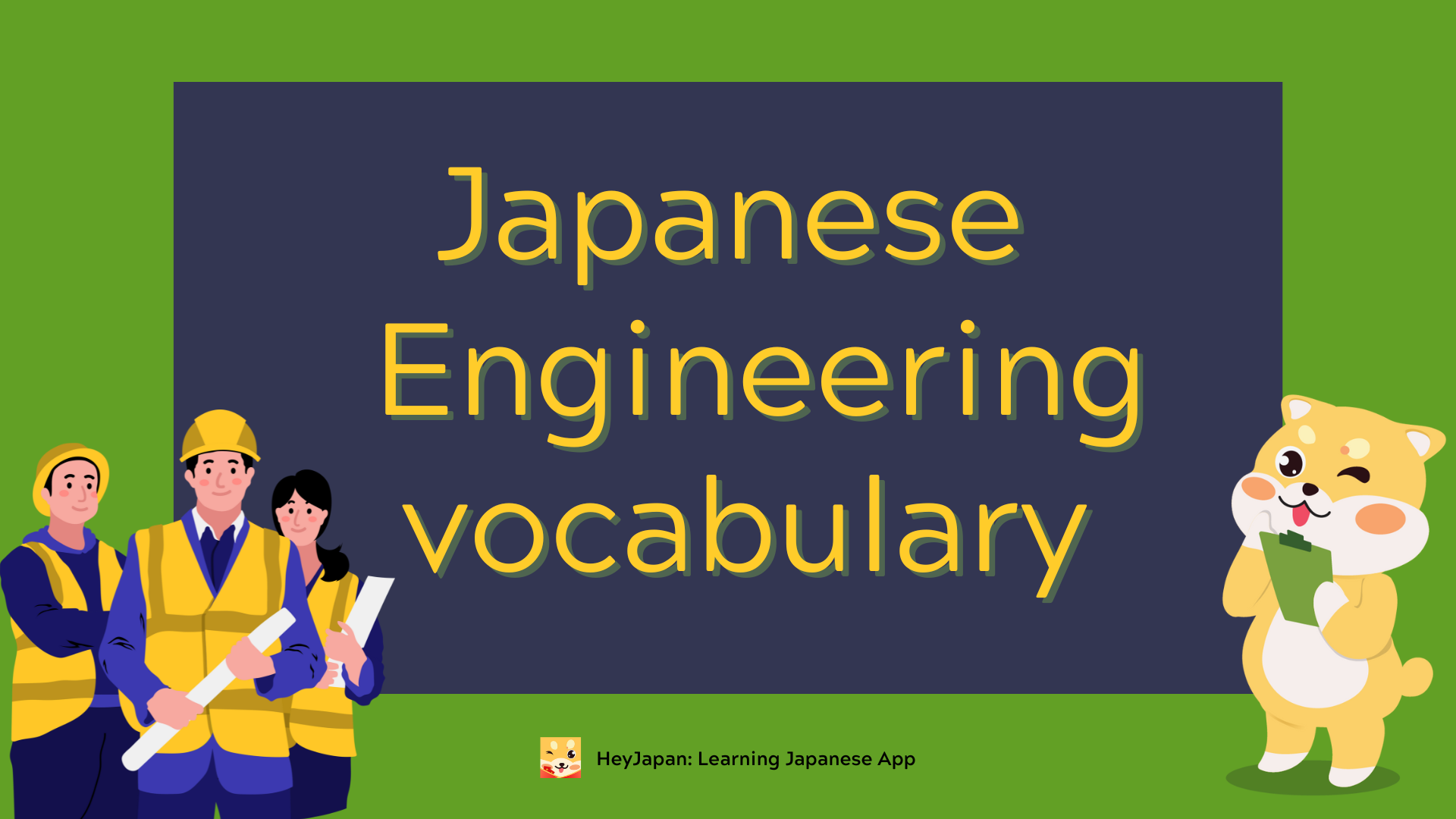- Why Learning Japanese Engineering Vocabulary Is Important
- Common Japanese Engineering Vocabulary by Topic
- 1. Mechanical Engineering
- 2. Civil Engineering
- 3. Electrical Engineering
- 4. Information Technology
- How to Learn Japanese Engineering Vocabulary
- Using Engineering Vocabulary in Professional Contexts
- Common Mistakes When Learning Japanese Engineering Vocabulary
Learning Japanese engineering vocabulary is essential for anyone working or studying in technical fields such as mechanical engineering, civil engineering, electrical engineering, and information technology.
Mastering these terms will allow you to communicate effectively in professional settings, prepare for industry exams, and understand technical documentation. In this article, we’ll explore over 100 essential Japanese engineering terms and how you can learn them efficiently.
Why Learning Japanese Engineering Vocabulary Is Important
For professionals and students in technical fields, knowing engineering vocabulary in Japanese is not just helpful—it’s essential. Whether you're dealing with technical manuals, product specifications, or engineering reports, the right vocabulary will help you understand and communicate ideas clearly. For those preparing for industry certifications or job opportunities in Japan, this vocabulary is the key to success.
Common Japanese Engineering Vocabulary by Topic
1. Mechanical Engineering

- 機械 (きかい, kikai) - Machine
- エンジン (enjin) - Engine
- 部品 (ぶひん, buhin) - Parts
- 圧力 (あつりょく, atsuryoku) - Pressure
- 摩擦 (まさつ, masatsu) - Friction
- 温度 (おんど, ondo) - Temperature
- 力学 (りきがく, rikigaku) - Mechanics
- 熱伝導 (ねつでんどう, netsudendou) - Heat conduction
- トルク (toruku) - Torque
- 機械工学 (きかいこうがく, kikaikougaku) - Mechanical engineering
- ベアリング (bearingu) - Bearing
- ピストン (pisuton) - Piston
- 熱膨張 (ねつぼうちょう, netsubouchou) - Thermal expansion
- 冷却 (れいきゃく, reikyaku) - Cooling
- 油圧 (ゆあつ, yuatsu) - Hydraulic pressure
2. Civil Engineering

- 建設 (けんせつ, kensetsu) - Construction
- 橋 (はし, hashi) - Bridge
- 道路 (どうろ, douro) - Road
- 材料 (ざいりょう, zairyou) - Materials
- 構造 (こうぞう, kouzou) - Structure
- 土木工学 (どぼくこうがく, dobokukougaku) - Civil engineering
- コンクリート (konkurito) - Concrete
- 基礎 (きそ, kiso) - Foundation
- シーリング (shiiringu) - Sealing
- 測量 (そくりょう, sokuryou) - Surveying
- 施工 (せこう, sekou) - Construction work
- 排水 (はいすい, haisui) - Drainage
- 断面 (だんめん, danmen) - Cross-section
- 構造解析 (こうぞうかいせき, kouzoukai-seki) - Structural analysis
3. Electrical Engineering

- 電気 (でんき, denki) - Electricity
- 回路 (かいろ, kairo) - Circuit
- 電力 (でんりょく, denryoku) - Electric power
- 導線 (どうせん, dousen) - Conductor
- 抵抗 (ていこう, teikou) - Resistance
- 容量 (ようりょう, youryou) - Capacity
- 直流 (ちょくりゅう, chokuryuu) - Direct current
- 交流 (こうりゅう, kouryuu) - Alternating current
- インバータ (inbaata) - Inverter
- コンデンサー (kondensaa) - Capacitor
- トランジスタ (toranjisuta) - Transistor
- 電圧 (でんあつ, den'atsu) - Voltage
- 回路図 (かいろず, kairozu) - Circuit diagram
- 絶縁体 (ぜつえんたい, zetsuentai) - Insulator
- 電磁波 (でんじは, denjiha) - Electromagnetic waves
4. Information Technology

- コンピュータ (konpyuuta) - Computer
- ソフトウェア (sofuto wea) - Software
- ネットワーク (nettowaaku) - Network
- データ (deeta) - Data
- システム (shisutemu) - System
- プログラム (puroguramu) - Program
- セキュリティ (sekyuriti) - Security
- 暗号 (あんごう, angou) - Encryption
- クラウド (kuraudo) - Cloud
- アルゴリズム (arugorizumu) - Algorithm
- ハードウェア (haadowea) - Hardware
- インターネット (intaanetto) - Internet
- デバッグ (debaggu) - Debugging
- データベース (deetabeesu) - Database
- 人工知能 (じんこうちのう, jinkouchinou) - Artificial intelligence
How to Learn Japanese Engineering Vocabulary
To effectively learn Japanese engineering vocabulary, immerse yourself in industry-specific resources. Use textbooks, technical papers, and online resources that provide the most accurate terms. Supplement your learning with apps like Anki or Memrise to practice and retain these terms. Engaging in discussions with colleagues or joining forums where technical topics are discussed can also help solidify your knowledge.
Using Engineering Vocabulary in Professional Contexts
Whether in meetings, technical reports, or presentations, using the right vocabulary in your communication is crucial. For instance, understanding and using terms like 回路 (kairo, circuit) and 電気 (denki, electricity) correctly will ensure you can participate in engineering discussions and contribute to technical documentation with ease.
Common Mistakes When Learning Japanese Engineering Vocabulary
One common mistake is using general Japanese terms in technical contexts. For example, using 機械 (kikai) for machines in casual conversations may be fine, but for more formal or industry-specific uses, you should be aware of terms like 設備 (setsubi) for equipment or systems.
Mastering Japanese engineering vocabulary is essential for anyone working or studying in technical fields. By learning and practicing these terms, you’ll improve your communication, better understand technical materials, and advance your career in Japan’s competitive engineering industries.









